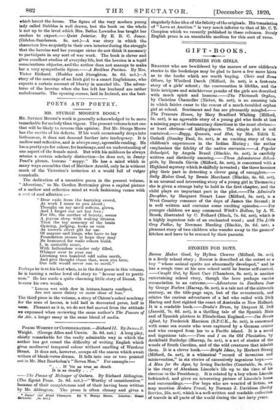POETS AND POETRY.
MR. STURGE MOORE'S BOOK.*
MR. STUROE MOORE'S work is generally acknowledged to be more remarkable for melody than vigour. The present volume is not one that will be likely to reverse this opinion. But Mr. Sturge Moore has the merits of his defects. If his work occasionally drops into listlessness, it does not descend further into inadequacy. It is mellow and reflective, and is always easy, agreeable reading. He bass pretty eye for colour, for landscape,and an understanding of one aspect of the female mind. But with his mildness he always retains a certain scholarly distinction—he does not, in Jenny Pearl's phrase, become " soppy." He has a mind which in many ways resembles that of Matthew Arnold, only he is without much of the Victorian's irritation at a world full of vulgar numskulls.
The dedication of a narrative poem in the present volume, " Aforetime," to Mr. Gordon Bottomley gives a capital picture of a mellow and reflective mind at work fashioning verses with a sort of cool affection :-
" Dear exile from the hurrying crowd, At work I muse to you aloud ; Thought on my anvil softens, glows, And I forget our art has foes ; For life, the mother of beauty, seems A joyous sleep with waking dreams. Then the toy armoury of the brain Opining, judging, looks as vain As trowels silver gilt for 11130 Of mayors and kings, who have to lay Foundation stones in hope they may Be honoured for walls others build.
I, in amicable muss,
With fathomless wonder only filled, Whisper over to your ear Listening two hundred odd miles north, And give thought chase that, were you hero, Our talk would never run to earth."
Perhaps he is at his best when, as in the first poem in this volume, be is taming a rather lewd old story to " favour and to pretti- ness." He has made a quite charming little story of Dana& To borrow his own words, " Leaves wet with dew in lettuce-hearts confined, Are not more dainty or more clear of hue."
The third piece in the volume, a story of Chiron's select academy for the sons of heroes, is told half in decorated prose, half in verse. Pleasant as it is, we do not feel moved from the attitude we expressed when reviewing the same author's The Powers of the Air, a longer essay in the same blend of media.


































 Previous page
Previous page